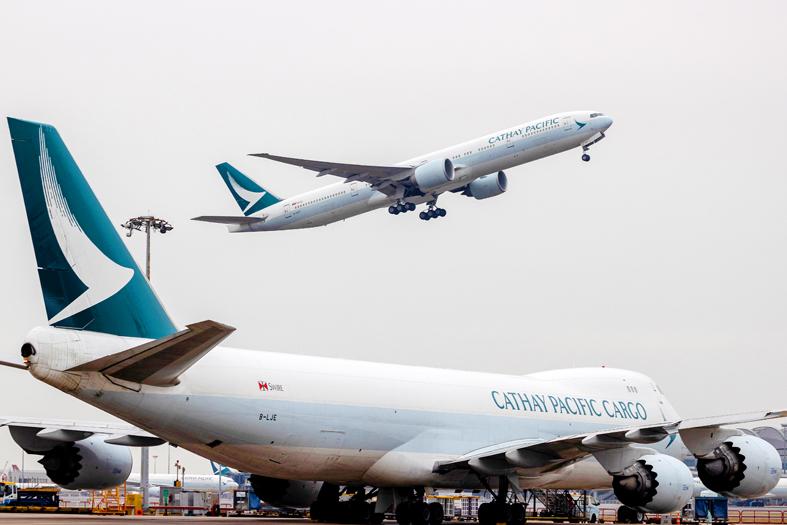Hong Kong carrier Cathay Pacific Airways Ltd (國泰航空) yesterday said it suffered a record US$2.8 billion loss last year as the COVID-19 pandemic wiped out demand for travel — and the airline warned of a long road to recovery ahead.
Cathay chairman Patrick Healy described last year as the “most challenging” in the airline’s 70-year history and said much would depend on how effective and widespread global vaccination programs are.
“It is by no means clear how the pandemic and its impact will develop over the coming months,” he said, adding that the group expected passenger traffic to remain “well below” half of pre-pandemic levels throughout this year.

Photo: EPA-EFE
The company’s losses were higher than estimates compiled by Bloomberg News.
Cathay racked up an attributable loss of HK$21.6 billion (US$2.8 billion) for last year, going deeper into the red as the year wore on.
Its second-half losses clocked in at HK$11.8 billion, up from HK$9.9 billion in the first six months of last year when the pandemic first emerged.
As the pandemic spread, the airline went on a cost-cutting spree, closing its Cathay Dragon (國泰港龍) subsidiary, making about 8,500 redundancies and slashing executive pay.
With the help of a government bailout Cathay underwent a recapitalization in July last year that raised HK$39 billion.
However, passenger numbers have been about 98 percent below pre-pandemic levels since April, and for much of last year the company was burning through cash at a rate of up to HK$1.5 billion a month.
By the end of last year, Cathay’s shares had fallen 29 percent.
In yesterday’s annual report, Cathay said it had managed to reduce the cash burn toward the end of the year, but longer quarantine restrictions that Hong Kong placed on all long-distance flight crew in January was now canceling out most of those savings.
Cathay said it would keep executive pay slashed and ask staff to go on a third round of unpaid leave — to which about 80 percent of employees have already signed up.
Its liquidity at the end of last year was HK$28.6 billion and Cathay also issued HK$6.74 billion in convertible bonds in January to secure more funds.
Hong Kong managed to keep COVID-19 infections comparatively low by bringing in strict quarantine measures for all arrivals early on in the pandemic.
Currently, most of those arriving in the territory must quarantine in a hotel for 21 days, one of the longest mandatory quarantine periods in the world. Outbound travel is almost non-existent, and there is little sign of those measures being lifted any time soon.
Last week, the head of Hong Kong’s tourist board said it could be at least six months before residents would be able to travel again.

PROTECTION: The investigation, which takes aim at exporters such as Canada, Germany and Brazil, came days after Trump unveiled tariff hikes on steel and aluminum products US President Donald Trump on Saturday ordered a probe into potential tariffs on lumber imports — a move threatening to stoke trade tensions — while also pushing for a domestic supply boost. Trump signed an executive order instructing US Secretary of Commerce Howard Lutnick to begin an investigation “to determine the effects on the national security of imports of timber, lumber and their derivative products.” The study might result in new tariffs being imposed, which would pile on top of existing levies. The investigation takes aim at exporters like Canada, Germany and Brazil, with White House officials earlier accusing these economies of

Teleperformance SE, the largest call-center operator in the world, is rolling out an artificial intelligence (AI) system that softens English-speaking Indian workers’ accents in real time in a move the company claims would make them more understandable. The technology, called accent translation, coupled with background noise cancelation, is being deployed in call centers in India, where workers provide customer support to some of Teleperformance’s international clients. The company provides outsourced customer support and content moderation to global companies including Apple Inc, ByteDance Ltd’s (字節跳動) TikTok and Samsung Electronics Co Ltd. “When you have an Indian agent on the line, sometimes it’s hard

‘SACRED MOUNTAIN’: The chipmaker can form joint ventures abroad, except in China, but like other firms, it needs government approval for large investments Taiwan Semiconductor Manufacturing Co (TSMC, 台積電) needs government permission for any overseas joint ventures (JVs), but there are no restrictions on making the most advanced chips overseas other than for China, Minister of Economic Affairs J.W. Kuo (郭智輝) said yesterday. US media have said that TSMC, the world’s largest contract chipmaker and a major supplier to companies such as Apple Inc and Nvidia Corp, has been in talks for a stake in Intel Corp. Neither company has confirmed the talks, but US President Donald Trump has accused Taiwan of taking away the US’ semiconductor business and said he wants the industry back

PROBE CONTINUES: Those accused falsely represented that the chips would not be transferred to a person other than the authorized end users, court papers said Singapore charged three men with fraud in a case local media have linked to the movement of Nvidia’s advanced chips from the city-state to Chinese artificial intelligence (AI) firm DeepSeek (深度求索). The US is investigating if DeepSeek, the Chinese company whose AI model’s performance rocked the tech world in January, has been using US chips that are not allowed to be shipped to China, Reuters reported earlier. The Singapore case is part of a broader police investigation of 22 individuals and companies suspected of false representation, amid concerns that organized AI chip smuggling to China has been tracked out of nations such